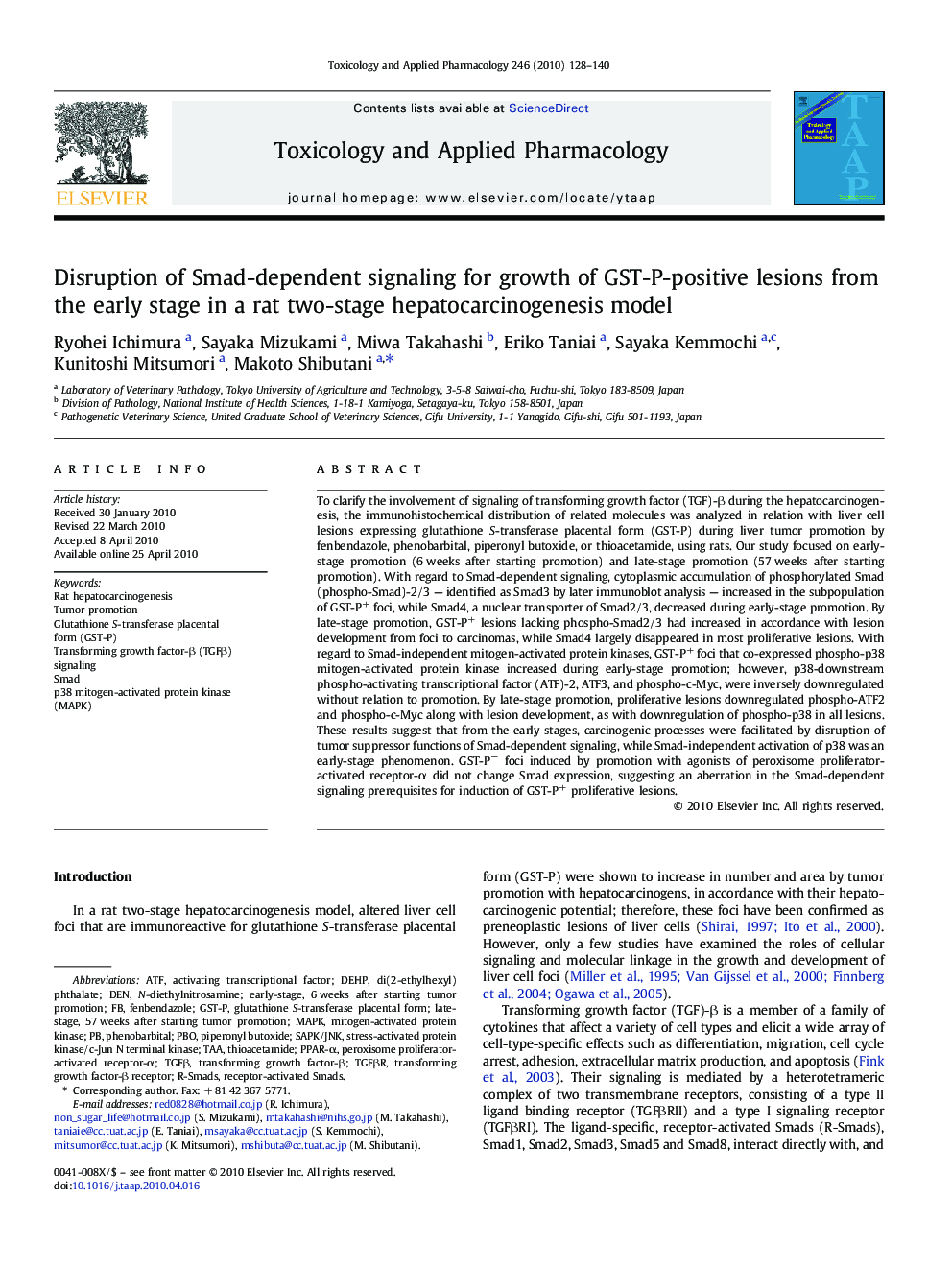| Article ID | Journal | Published Year | Pages | File Type |
|---|---|---|---|---|
| 2569822 | Toxicology and Applied Pharmacology | 2010 | 13 Pages |
Abstract
To clarify the involvement of signaling of transforming growth factor (TGF)-β during the hepatocarcinogenesis, the immunohistochemical distribution of related molecules was analyzed in relation with liver cell lesions expressing glutathione S-transferase placental form (GST-P) during liver tumor promotion by fenbendazole, phenobarbital, piperonyl butoxide, or thioacetamide, using rats. Our study focused on early-stage promotion (6 weeks after starting promotion) and late-stage promotion (57 weeks after starting promotion). With regard to Smad-dependent signaling, cytoplasmic accumulation of phosphorylated Smad (phospho-Smad)-2/3 - identified as Smad3 by later immunoblot analysis - increased in the subpopulation of GST-P+ foci, while Smad4, a nuclear transporter of Smad2/3, decreased during early-stage promotion. By late-stage promotion, GST-P+ lesions lacking phospho-Smad2/3 had increased in accordance with lesion development from foci to carcinomas, while Smad4 largely disappeared in most proliferative lesions. With regard to Smad-independent mitogen-activated protein kinases, GST-P+ foci that co-expressed phospho-p38 mitogen-activated protein kinase increased during early-stage promotion; however, p38-downstream phospho-activating transcriptional factor (ATF)-2, ATF3, and phospho-c-Myc, were inversely downregulated without relation to promotion. By late-stage promotion, proliferative lesions downregulated phospho-ATF2 and phospho-c-Myc along with lesion development, as with downregulation of phospho-p38 in all lesions. These results suggest that from the early stages, carcinogenic processes were facilitated by disruption of tumor suppressor functions of Smad-dependent signaling, while Smad-independent activation of p38 was an early-stage phenomenon. GST-Pâ foci induced by promotion with agonists of peroxisome proliferator-activated receptor-α did not change Smad expression, suggesting an aberration in the Smad-dependent signaling prerequisites for induction of GST-P+ proliferative lesions.
Keywords
Rat hepatocarcinogenesisPiperonyl butoxideN-diethylnitrosamineGST-PR-SmadsSMADPPAR-αPBOactivating transcriptional factorDenReceptor-activated SmadsDEHPTGFβATFTGFβRTAAMAPKSAPK/JNKTumor promotiontransforming growth factor-βtransforming growth factor-β receptorThioacetamidedi(2-ethylhexyl) phthalateglutathione S-transferase placental formPhenobarbitalEarly-stageperoxisome proliferator-activated receptor-αmitogen-activated protein kinasep38 mitogen-activated protein kinase (MAPK)fenbendazole
Related Topics
Life Sciences
Environmental Science
Health, Toxicology and Mutagenesis
Authors
Ryohei Ichimura, Sayaka Mizukami, Miwa Takahashi, Eriko Taniai, Sayaka Kemmochi, Kunitoshi Mitsumori, Makoto Shibutani,
